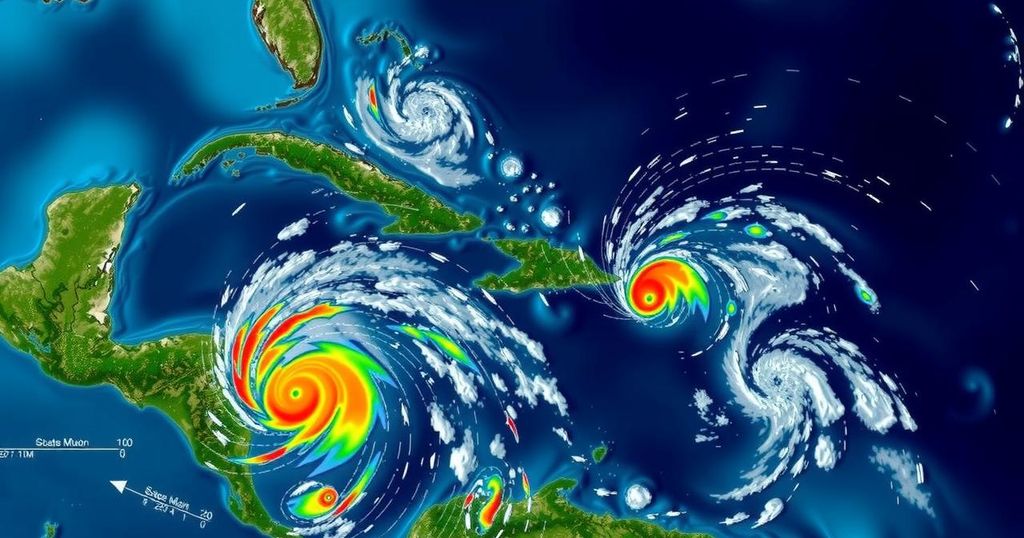Weather
World news
AFRICA, BE, CARIBBEAN, CLIMATE PREDICTION CENTER, CUBA, EVACUATIONS, FLORIDA, HURRICANE, HURRICANE BERYL, HURRICANE SEASON, MATTHEW ROSENCRANS, MICHAEL BRENNAN, NATIONAL HURRICANE CENTER, NATIONAL OCEANIC AND ATMOSPHERIC ADMINISTRATION, NATURAL DISASTERS, NOAA, NORTH AMERICA, RICK SPINRAD, UNITED STATES, WEATHER, WESTERN AFRICA
David O'Sullivan
0 Comments
2024 Atlantic Hurricane Season Concludes with 18 Named Storms
The 2024 Atlantic hurricane season ended with 18 named storms, including 11 hurricanes and five major hurricanes, aligning with NOAA’s forecasts. While it featured intense activity and record-breaking events like Hurricane Beryl, the season also saw advancements in forecasting and response, underscoring the continuous evolution in hurricane science.
The 2024 Atlantic hurricane season has officially concluded, registering a total of 18 named storms, inclusive of 11 hurricanes and five major hurricanes. According to the National Oceanic and Atmospheric Administration (NOAA), this season was characterized by notable scientific significance and operational challenges, with five of the hurricanes making landfall in the continental United States, two of which were classified as major hurricanes. While the number of storms exceeded the typical averages, it remained within the forecasted ranges provided by NOAA’s Climate Prediction Center earlier in the season.
The season began with an intense series of storms but experienced a temporary lull before reviving later in the timeline. Matthew Rosencrans, NOAA’s lead hurricane forecaster, remarked that this mid-season pause was attributed to strong winds and rain in Western Africa which hindered storm formation. Among the notable storms this year, Hurricane Beryl became the earliest recorded Category-5 hurricane in the Atlantic basin, while Hurricane Helene made history by being forecasted as a major hurricane prior to its classification as a tropical depression.
NOAA Administrator Rick Spinrad underscored the necessity of scientific forecasting, emphasizing, “As hurricanes and tropical cyclones continue to unleash deadly and destructive forces, it is clear that NOAA’s critical science and services are needed more than ever by communities, decision makers, and emergency planners.” Additionally, Hurricane Milton exhibited remarkable rapid intensification, escalating wind speeds by 90 miles per hour within a single day, generating significant storm-related impacts like flooding and tornadoes in Florida.
Technological advances were also instrumental this season, with Dr. Michael Brennan, the Director of NOAA’s National Hurricane Center, noting that preliminary data from 2024 showcases the most accurate NHC forecast track predictions ever recorded. The efforts of Hurricane Hunter aircraft were vital, contributing 392 mission hours and deploying over 1,246 scientific instruments within hurricanes to gather critical data about storm dynamics.
In contrast to the Atlantic activity, the Pacific hurricane season experienced below-normal activity, recording just 12 named storms in the eastern Pacific and two in the central Pacific. Overall, the 2024 Atlantic hurricane season exemplified both challenges and advancements in storm forecasting and response strategies.
The Atlantic hurricane season, typically spanning from June 1 to November 30, is a critical period for meteorological observation and disaster preparedness. The National Oceanic and Atmospheric Administration (NOAA) utilizes advanced forecasting techniques and historical data to predict storm activity. This season, predictions suggested an above-average occurrence of storms driven by prevailing environmental conditions. The evaluation of activity within this context allows for better management and response to potential threats posed by hurricanes, which can have devastating effects on communities, particularly along the U.S. coastline.
The conclusion of the 2024 Atlantic hurricane season, with its 18 named storms, underscores both the challenges posed by increasingly active weather patterns and the advancements in meteorological science that assist in tracking and forecasting these events. The exceptional achievements in forecasting accuracy, along with the historical significance of certain storms, highlight the ongoing evolution of our understanding and the importance of preparedness measures taken by communities facing such natural disasters.
Original Source: caribbean.loopnews.com




Post Comment